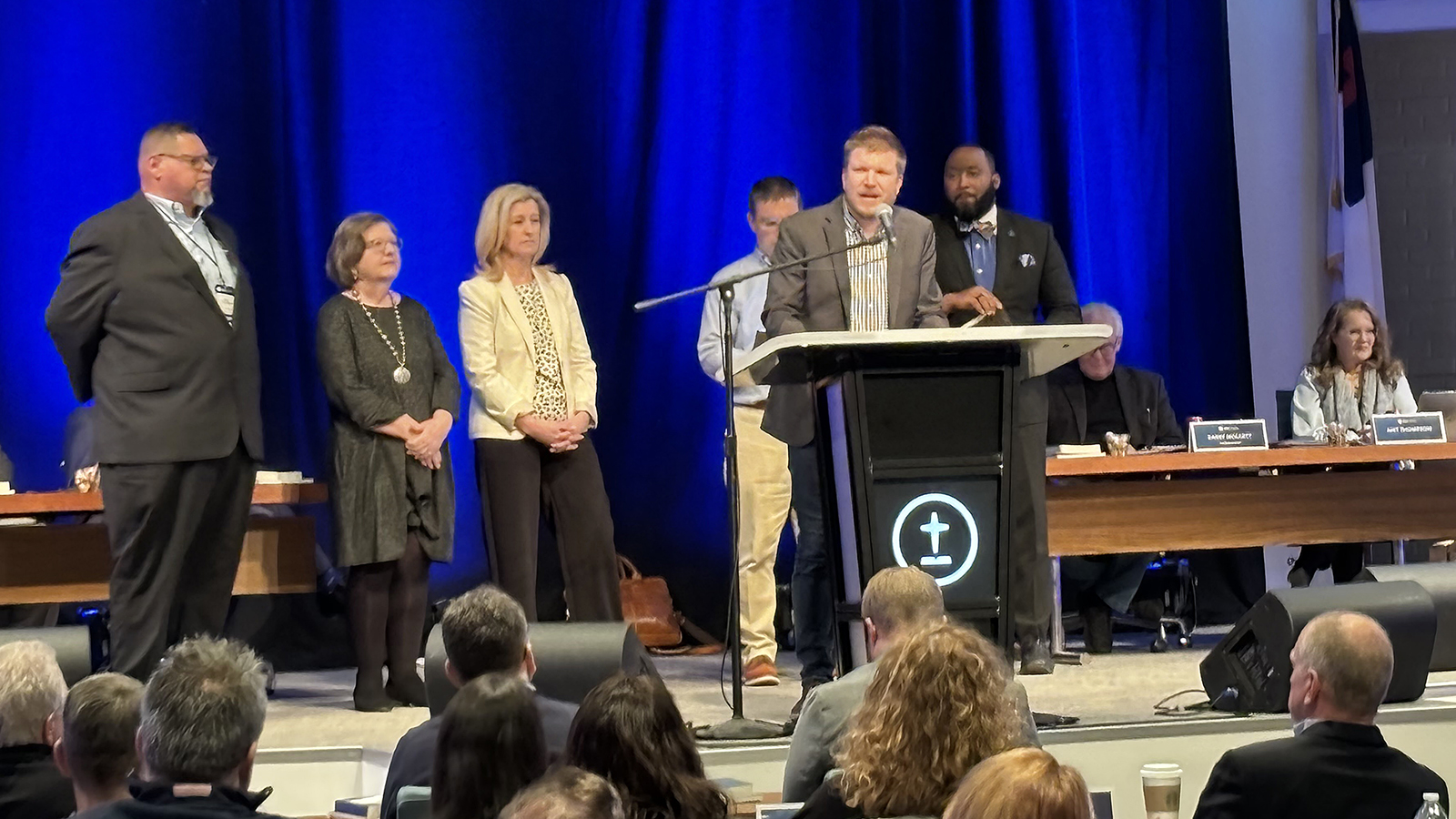NASHVILLE, Tenn. (RNS) — Leaders of two major Southern Baptist mission boards said they will not help fund a proposed independent nonprofit meant to implement the denomination’s abuse reforms.
Plans for the nonprofit were announced on Monday night (Feb. 19) during a meeting of the Southern Baptist Convention’s Executive Committee.
Leaders of the SBC’s Abuse Reform Implementation Task Force said the new nonprofit is needed to make those reforms a reality.
“Given the current legal and financial challenges facing the SBC and the Executive Committee, the formation of a new, independent organization is the only viable path that will allow progress toward abuse reform to continue unencumbered and without delay,” Josh Wester, the North Carolina pastor who chairs the ARITF, told members of the SBC’s Executive Committee. “To do this, we have to do this together.”
Wester said he hoped leaders of the SBC’s entities, including its North American Mission Board, International Mission Board and seminaries, along with SBC President Bart Barber, would help find funding for the proposed nonprofit, known as the Abuse Response Commission.

North Carolina pastor Joshua Wester, chair of the SBC’s Abuse Reform Implementation Task Force, with fellow members of the task force, speaks at the SBC Executive Committee’s meeting in Nashville, Tenn., Feb. 19, 2024. (RNS photo/Bob Smietana)
Currently, the work of the Abuse Reform Implementation Task Force has been paid for out of $3 million set aside by Send Relief, a humanitarian effort run by the two mission boards, to get abuse reforms off the ground.
On Wednesday, Send Relief said those funds cannot be used for the new nonprofit.
“While Send Relief has been privileged to make funds available to the ARITF to help care for survivors and assist churches in efforts to prevent abuse, those funds have never been committed to help form a separate organization outside the SBC, such as the proposed Abuse Response Commission,” Send Relief President Bryant Wright, IMB President Paul Chitwood and NAMB President Kevin Ezell said in a statement Wednesday.
The three leaders said many questions remain about the structure and leadership of the proposed nonprofit. They did say the Send Relief funds can still be used by the task force.
“Though Send Relief funds are not available for a non-SBC organization, they do remain available to the ARITF for its assigned work within the SBC,” they wrote.
In a follow-up response, a spokesperson for the IMB said the statement addressed the original intent of the Send Relief funds.
“The statement today represents the original intent of the granted funds and the reaffirmed commitment to that intent to fund work within the SBC, not outside the SBC,” the spokesman told Religion News Service.
Abuse reforms in the SBC have stalled over the past two years, largely due to legal and financial constraints, as well as the limits of a volunteer task force. That’s raised questions of whether those reforms — passed in 2022 during the SBC’s annual meeting — will ever be fully implemented.

Abuse survivors Debbie Vasquez, from left, Jules Woodson and Tiffany Thigpen turn to watch as messengers vote on a resolution in favor of sexual abuse victims during the Southern Baptist Convention annual meeting in Anaheim, California, on June 15, 2022. (RNS photo/Justin L. Stewart)
During that meeting, local church representatives, known as messengers, approved plans for a Ministry Check website that would include the names of pastors who have been convicted of abuse, had a civil judgment against them for abuse or been “credibly accused” of abuse. That website was launched last year but no names of abusive pastors have been listed.
The messengers also approved more training and resources to help churches prevent abuse and to respond appropriately when it happens. The task force, in a news conference Tuesday, said new training materials will be available in time for the SBC’s annual meeting in June.
Wester said that messengers at the SBC annual meeting in 2022 asked the task force to collaborate with SBC entity heads to find funding for reforms.
“We have been and remain committed to this directive as we work toward a long-term solution for sexual abuse reform. We are grateful for Send Relief’s investment in this cause, and we are hopeful that the SBC’s national leaders will help the ARITF determine the best path forward in financing future reform efforts,” he said.
A past proposal to fund abuse reforms from the Cooperative Program, a joint funding initiative that brings in hundreds of millions of dollars for missions, was shot down in 2022. That led Send Relief to set aside $3 million for the SBC’s response to sexual abuse and another million to pay for abuse survivor care.
No funds for the Abuse Response Commission were included in a proposed Cooperative Program Budget passed during the Executive Committee meeting this week, as the denomination’s rules require those funds to go to SBC entities. No rules would prohibit entities from donating to the work of an outside group.
This week, Brent Leatherwood, president of the SBC’s Ethics and Religious Liberty Commission, said he would ask trustees of the ERLC to contribute to the start-up costs of the Abuse Reform Commission.
RELATED: Will the Southern Baptist Convention’s Cooperative Program crumble?
Discover more from CaveNews Times
Subscribe to get the latest posts sent to your email.

























![Exploring the Serene Beauty of Nature: A Reflection on [YouTube video title]](https://cavemangardens.art/storage/2024/04/114803-exploring-the-serene-beauty-of-nature-a-reflection-on-youtube-video-title-360x180.jpg)


























